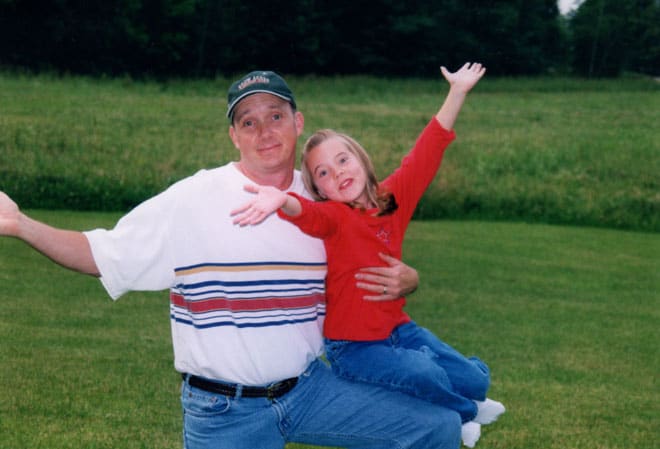Brittany Collins
Co-Survivor

I have found myself thinking a lot about hope, lately: whether it is definable, tangible, fixed or fluid. Is it given? Practiced? Found? And what can we do to live with hope—to embody it, not only within and for ourselves, but so that we may exude and share it with others in times of need?
Growing up, I hated the word “hope.” It felt trite and belittling. I heard it a lot when my father was diagnosed with metastatic breast cancer at the age of 43 and again, years later, when my mother found her Stage I tumor during a monthly self-exam. She underwent chemotherapy while caring for my father during his final months and into the fall after his passing. Hope seemed a shield that allowed well-meaning people (family members, friends, acquaintances) to hide from our reality: the reality of breast cancer.
I remember sitting in high school assemblies, listening to school clubs share announcements about the breast cancer fundraisers that they were holding at football games or school plays. I remember my cheeks burning, proud of their commitment, but frustrated and sometimes embarrassed by the fact that nobody seemed to know about male breast cancer. Never were men mentioned. Never were people like my dad, the man whom I went home to everyday, whom I watched struggle to climb a set of stairs, spell his name, eat without assistance, included in depictions of—or rallies for—breast cancer causes. Hope did not encompass the endurance required to weather such a storm. And neither could it be gleaned from pink posters. Instead, it was something more nuanced, more internal, more real.
I felt anxious but hopeful at the age of eighteen as I sat in the glass-windowed tower of Dana Farber Cancer Institute in Boston, Massachusetts, and waited for my first consultation with a genetic counselor. My father, a BRCA2 carrier, always shared the phrase “Knowledge is power” when talking about his disease. Though young, I chose to pursue knowledge (which, for me, provided empowerment and fostered hope) rather than wade in ambiguity. Positive results would allow me to take preventative action. Negative results would disentangle one facet of my family’s breast cancer journey.
Today, seven years after my father’s passing, it is still Science that gives me hope. Whereas pink ribbons give me spirit, hope—for me—is garnered from the scientific advancements that bring us closer to a cure each day. From breakthroughs in genomics and immunotherapy, to advanced surgical techniques and knowledge of preventative lifestyle habits, the world of cancer care is changing. And not a moment too soon.
This October, I choose to see past the pink and into the reality of researchers spending long hours in the lab; doctors treating their patients with candidness and care; family members and friends lending support to loved ones effected by cancer. I choose to invest in Science, recognizing that an investment in cancer care is an investment, not only in my future, but in all of our futures, for generations to come.
